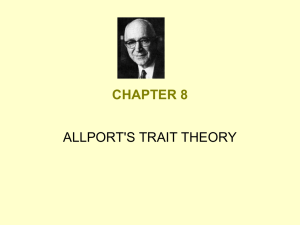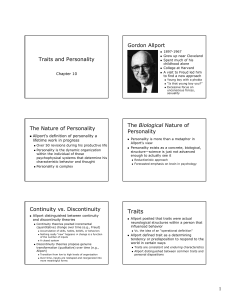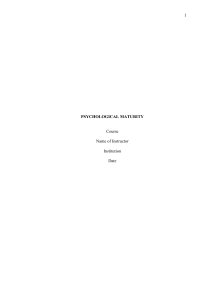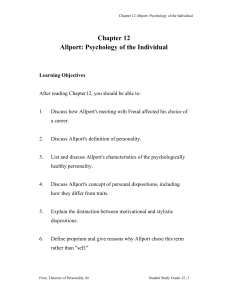Theories of Personality 5th Edition
advertisement
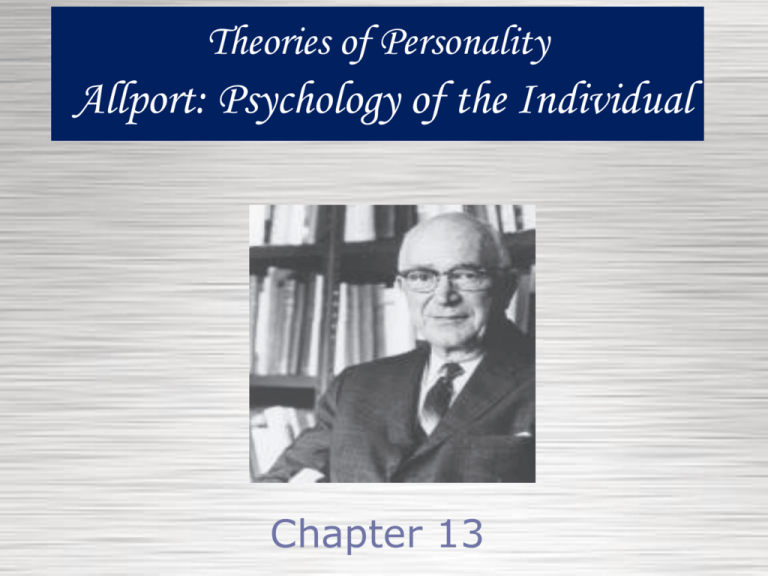
Theories of Personality Allport: Psychology of the Individual Chapter 13 Outline • Overview of the Psychology of the Individual • Biography of Gordon Allport • Allport’s Approach to Personality Theory • Structure of Personality • Motivation Outline • The Study of the Individual • Related Research • Critique of Allport • Concept of Humanity Overview of the Psychology of the Individual • Emphasized Uniqueness of the Individual • Traits Do Not Capture Individuality • Studied the Individual (Morphogenic Science) in contrast to Nomothetic Methods • Broad, Comprehensive Theory Preferable to Narrow Theory Biography of Allport • Born in Montezuma, Indiana in 1897 • Youngest son of a country doctor and a former schoolteacher • Earned undergraduate degrees in philosophy and economics from Harvard in 1919 • After fortuitous meeting with Freud, decided to complete a PhD in psychology at Harvard in 1922 • President of American Psychological Association in 1939 • Died in 1967 of lung cancer Allport’s Approach to Personality Theory • Sought to Answer Three Questions: – What Is Personality? • Personality is both physical and psychological • Includes both overt and covert thoughts • Not only is but does • Product and process • Structure and Growth Allport’s Approach to Personality Theory • What Is the Role of Conscious Motivation? – Healthy adults aware of what and why they are acting – Accepted self-report at face value – Some motivation is driven by hidden impulses – Most compulsive behaviors originate in childhood Allport’s Approach to Personality Theory • What Are the Characteristics of a Healthy Person? – Six criteria for maturity: • Extension of the sense of self • Warm relating of self to others • Emotional security or self-acceptance • Realistic perception of their environment • Insight and humor • Unifying philosophy of life Structure of Personality • Refers to Basic Units – Common traits • Held by many people – Personal Dispositions • Levels of Personal Dispositions – Cardinal dispositions – Central dispositions – Secondary dispositions Structure of Personality • Motivational Dispositions – Motivation from basic needs and drives – Initiate actions • Stylistic Dispositions – Guide actions – Exp: How to dress? • Proprium – Behaviors that are regarded as warm, central, and important to their lives – Values, beliefs, styles… Motivation • A Theory of Motivation – Theory Must Include Both Reactive and Proactive Behaviors • Functional Autonomy – Perseverative Functional Autonomy • Neurological principles • Exp:a rat in a maze? • Alcohol and other dependences – Propriate Functional Autonomy • Occupations, hobbies, interests… Related Research • The Religious Orientation Scale (ROS) – Extrinsic orientation – Intrinsic orientation • Religion, Prayer, and Health – Powell et al. (2003) • Attending church regularly is associated with feeling better and living longer – Masters et al. (2005) • Religion and cardiovascular health • Intrinsic religious orientation serves as a buffer against everyday life stressors – Smith et al. (2003) • Religion and depression • Intrinsic religious orientation is negatively related, and extrinsic orientation positively related, to depression • How to Reduce Prejudice: Optimal Contact – Pettigrew & Tropp (2005, 2009) • Optimal contact reduces prejudice, not only toward races, but also toward the elderly and the mentally ill Critique of Allport • Allport’s Theory Is: – High on Parsimony and Internal Consistency – Moderate on Generating Research and Guiding Action – Low on Falsifiability and Organizing Knowledge Concept of Humanity • Free Choice over Determinism • Optimism over Pessimism • Teleology over Causality • Conscious over Unconscious • Social Influence over Biology • Uniqueness over Similarity

